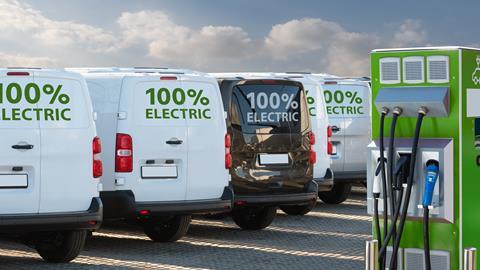The Zero Emission Vehicle (ZEV) mandate becomes law today (3 January), requiring all new cars and vans to be zero emission by 2035.
Under the legislation, known as the Vehicle Emissions Trading Schemes Order 2023, the ZEV mandate sets out the percentage of new zero emission cars and vans that manufacturers will be required to produce each year up to 2030.
It requires 80% of new cars and 70% of new vans sold in Great Britain to be zero emission by 2030, increasing to 100% by 2035.
The targets are graduated with manufacturers required to ensure electric vans make up 10% of the market share this year, 16% in 2025, and 24% by 2026. By 2027 the target rises to 34% and to 46% in 2028, increasing to 58% by 2029 and 70% by 2030.
The ZEV Mandate also allows for a tradable scheme. Manufacturers receive allowances, permitting them to sell up to certain number of diesel vans and cars per year (the inverse of the ZEV target). For every non-ZEV car or van they sell they spend some of their allowance.
Any manufacturer selling more ZEVs than required will have spare allowances that they can sell on the open market to manufacturers that have not sold enough ZEVs.
Technology and decarbonisation minister Anthony Browne said the ZEV mandate “will further boost the economy and support manufacturers to safeguard skilled British jobs in the automotive industry”.
He added: “We are providing investment certainty for the charging sector to expand our charging network which has already grown by 44% since this time last year.”
Meeting the ZEV mandate requirements could be a struggle for manufacturers. Whilst electric cars now make up 16% of the car market, in November the Society of Motor Manufacturers and Traders (SMMT) revealed a fall in battery electric van (BEV) registrations for the second month, with 1,631 units registered – some 343 fewer than in November last year.
Diesel van registrations in 2023 remained at around 93%, which has prompted SMMT to call on government to help accelerate the roll out of public charge points along with a national delivery plan that considers the specific needs of larger vans.

















